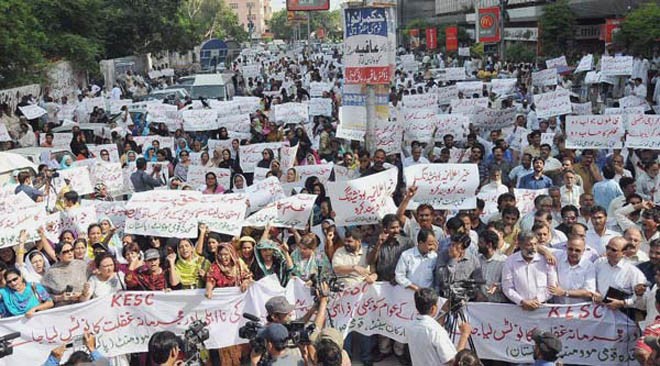
The recent death of sanitary worker Irfan Masih in Umerkot raises questions about unsafe working conditions and religious disharmony in the region

Umerkot, the gateway of Umrano Desert, adjacent to Thar Desert in eastern Sindh, is a dirty old town. But these days it looks even dirtier, as sanitary workers are on strike. Their protest is regarding doctors who have been accused of criminal negligence for refusing medical treatment to one of their co-workers, Irfan Masih.
According to Irfan’s family, doctors at the local hospital refused to treat Irfan, 35, after he fell unconscious while cleaning a manhole, on the pretext that they were fasting and couldn’t treat a patient covered in sewerage sludge.
"For a doctor, all humans should be equal. But they refused to treat my son since they thought he was filthy," says Irshad Masih, Irfan Masih’s bereft mother. She was mourning her son along with a large crowd that had gathered to grieve with her in the courtyard of a small house in the Christian Colony of Umerkot.
On June 1 Yaqoob Masih, an employee of Municipal Committee Umerkot, fainted after descending into a choked manhole without a safety kit. Irfan, along with Shaukat Masih, another sanitary worker, went into the manhole to rescue Yaqoob. Even as they were descending, they were afraid as the memory of losing a colleague in a similar situation in 2014 haunted them.
"On the morning of June 1, my brother and his co-workers were sitting in the office, when municipal officials asked them to open a clogged manhole on main Chhor Cantt Road. They were told they would be fired if they refused to do the job," says Pervaiz Masih, Irfan’s cousin, adding that Irfan and his colleagues asked the municipal staff to provide them appropriate machinery to avoid manual scavenging and endangering their lives. "But the officials forced them to open the manhole. They were not given a safety kit."
In both government and private sectors across the country, it is the Christian community that is engaged in sanitation, this stands true for Umerkot as well. Although there is a significant Hindu and Muslim community living in Umerkot, no one from these communities is involved in sanitary work, these jobs are left for the Christian community. Sanitary workers are made to perform their duties without safety gear and equipment, endangering their lives due to the risk of inhaling poisonous gases.
Yaqoob was the first one to be hit by the poisonous gases trapped inside the manhole. After Irfan and his colleagues went in to rescue Yaqoob, tragically, the rope being used to pull them out, broke. All three men fell in.
The three of them were rushed to the hospital where doctors allegedly refused to treat them until the sludge on their bodies was cleaned. Irfan could not survive the delay and passed. The two others were referred to a private hospital in Karachi, where local municipal administration has been paying for their expensive treatment.
"He was the only bread earner in our family. What if the one covered in filth was the doctor’s own son? Would he have asked him to be cleaned before treatment? They hate us. No one even sits with us," regrets Irshad, Irfan’s mother. Irfan’s father, Nazeer Masih, feels as bitter. "Politicians came only after the media reported his death widely."
Umerkot police has registered a case against the MS Civil Hospital Umerkot, Dr Jam Kumbher and three other doctors. However, all of them have been granted bail. They all deny asking Masih family to clean Irfan before treatment, but a video circulating on social media shows the Masih family cleaning the body of the fainted sanitary worker, Irfan, at the hospital.
The Sindh government has announced a compensation of Rs1 million and a job to someone from the family of Irfan Masih. "I need justice. Doctors must be punished so that in future no one refuses treatment to a sewer cleaner," says Irfan’s mother.
Meanwhile, the hospital authorities have submitted an application to register cases against Irfan’s 13 co-workers who protested against his death under the terrorism act. "They brought batons and acid to attack us," claims Dr Jam Kumbher.
A majority of residents of the Christian Colony, where Irfan Masih used to live, are sanitary workers. Residents are attached with the Catholic Church of Kunri, a town in Umerkot district. Kunri was developed by the Municipal Committee Umerkot for Christians; at the start it was a settlement of 15 residential quarters, but over the years, it has grown and today it comprises no less than 40 households.
Umerkot is the birthplace of Mughal emperor Akbar, the pioneer of Hindu-Muslim harmony in South Asia. Though the social fabric between Muslims and non-Muslims is still strong, and this can be seen in the way they invite each other to weddings and arrange food depending on their dietary requirements; yet in recent years, relations between the communities have begun to alter. This recent incident, therefore, has made the locals question if this was an individual act or a reflection of the changing mindset.
In the past, Muslims refrained from slaughtering cows out of respect for the Hindu belief. Now a butcher shop selling cow meat has surfaced in the main market.
Back in the day Hindus looked after Imambargahs and managed Muharram processions; this is no longer the case. Earlier, Hindus ran shops and conducted businesses in the city but now Muslims too have entered the market and are competing, causing friction between the two communities.
A member of the National Assembly representing Pakistan Tehreek-e- Insaaf, Lal Malhi, says that in Umerkot a dispute over business or property always turns nasty and becomes an issue about religion. According to Malhi, Muslims think that a Hindu opponent can be forced to withdraw their case because of their vulnerable position.
Of the 386,000 voters registered in Umerkot, 49 per cent are Hindus and yet most of political parties are nominating Muslim candidates.